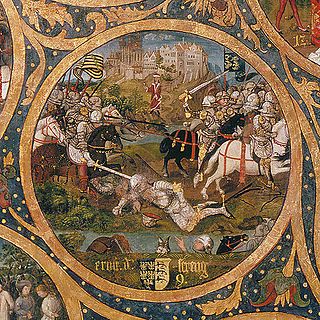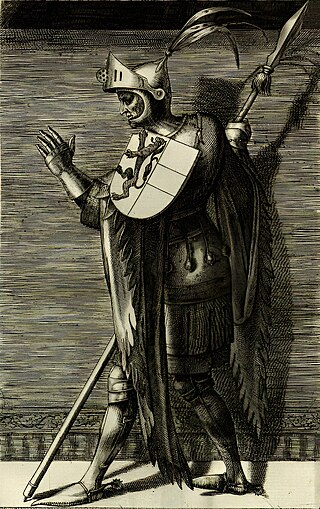Sources
- Thompson, James Westfall (1928). Feudal Germany, Volume II. New York: Frederick Ungar Publishing.
Budivoj, Buthue, or Butue (Polish Budziwoj) (died 1071-1075) was the eldest son of Gottschalk, an Obotrite prince, by a mistress. He allied with the dukes of Saxony in order to recover the power and position of his father, lost since Gottschalk's death (1066) to the pagan Kruto.
Between 1071 and 1075, Budivoj was led into a trap at Plune by Kruto and killed. According to Helmold, Pribislav was probably his son. Budivoj was praised by contemporaries and later writers for his hospitality and Christianity. Budivoj's younger brother Henry eventually avenged Gottschalk's death and took over the Abodrite lands.

Plön is the district seat of the Plön district in Schleswig-Holstein, Germany, and has about 8,700 inhabitants. It lies right on the shores of Schleswig-Holstein's biggest lake, the Great Plön Lake, as well as on several smaller lakes, touching the town on virtually all sides. The town's landmark is Plön Castle, a chateau built in the 17th century on a hill overlooking the town.
Gottschalk, sometimes rendered as Godescalc, was a prince of the Obotrite confederacy from 1043 to 1066. He established a Polabian Slavic kingdom on the Elbe in the mid-11th century. His object in life seems to have been to collect the scattered tribes of the Slavs into one kingdom, and to make that kingdom Christian.

Ernest, known as Ernest the Brave, was the Margrave of Austria from 1055 to his death in 1075. He was a member of the House of Babenberg.

Polabian Slavs, also known as Elbe Slavs and more broadly as Wends, is a collective term applied to a number of Lechitic tribes who lived scattered along the Elbe river in what is today eastern Germany. The approximate territory stretched from the Baltic Sea in the north, the Saale and the Limes Saxoniae in the west, the Ore Mountains and the Western Sudetes in the south, and Poland in the east.
Otto of Nordheim was Duke of Bavaria from 1061 until 1070. He was one of the leaders of the Saxon revolt of 1073–1075 and the Saxon revolt of 1077–1088 against King Henry IV of Germany.
Toirdhealbhach ua Briain, anglicised Turlough O'Brien, was King of Munster and effectively High King of Ireland. A grandson of Brian Bóruma, Toirdelbach was the son of Tadc mac Briain who was killed in 1023 by his half-brother Donnchad mac Briain.

Godfrey IV, known as the Hunchback, was Duke of Lower Lorraine from 1069 until his death in 1076, succeeding his father Godfrey the Bearded.
Roger de Breteuil, 2nd Earl of Hereford, succeeded in 1071 to the earldom of Hereford and the English estate of his father, William Fitz-Osbern. He is known to history for his role in the Revolt of the Earls.
Ermengol or Armengol IV (1056–1092), called el de Gerb or Gerp, was the Count of Urgell from 1066 to his death. He was the son of Ermengol III and Adelaide.
Kruto the Wend, son of Grin or Grinus, was a prince of Wagria. James Westfall Thompson believed his family belonged to the Rani of Rugia.
Henry was an Obotrite prince or king (1093–1127) from the Nakonid dynasty; he was regarded by contemporaries as "King of the Slavs". The Obotrite realm reached its greatest area during Henry's rule, extending from the Elbe to the Oder and from the Havelland to the Baltic Sea.
The Battle of Schmilau was a battle between a coalition of Christian forces and pagan Slavic Obotrites in 1093.

Mecklenburg Castle was a medieval castle and a residential capital of the Nakonid and Nikloting dynasties of the Obotrites. It was located just south of the modern village Dorf Mecklenburg, seven kilometres south of the Bay of Wismar in Mecklenburg-Vorpommern, Germany. The only remnants of the ruined castle are parts of an earthen wall. Some scholars have associated Mecklenburg with the medieval trading emporium Reric.
Bucu or Buku is a hill island surrounded by the Trave and Wakenitz Rivers in Lübeck, Germany. It is also the name of a medieval Slavic castle, now ruined, on the island. Count Adolf II of Holstein founded Lübeck on the island in 1143. The Burgkloster, or fortified monastery, of Lübeck is located atop the ruins of Bucu. "Bucu" is also the name of a hill.
Blus was an Obotrite noble, brother-in-law of prince Gottschalk, who, after Gottshalk's death in 1066 led a pagan uprising in Obotrite territory. The pagan Slavs exiled Gottschalk's Christian wife and killed the bishop of Mecklenburg, John Scotus, whose head was sent to the city of Radgosc. Blus for a brief period led the Obotrites and it was under his command that their forces sacked Hamburg and Hedeby.
Donnchad mac Domnaill Remair, also known as Donnchadh mac Domhnall Reamhair, was a late-eleventh-century ruler of the kingdoms of Leinster and Dublin. He was a son of Domnall Remar mac Máel na mBó. Donnchad was slain in 1089.
Zaheer-ul-Daulah Artuk Beg, known as Artuk Bey, was a Turkoman commander of the Seljuk Empire in the 11th century, chief of the Oghuz tribe of Döğer, and eponymous founder of the Artuqid dynasty. His father's name was Eksük. He was the Seljuk governor of Jerusalem between 1085–1091. Although the Artuqid dynasty was named after him, actually the dynasty was founded by his sons Sökmen and Ilghazi after his death. He was also father to Alp-Yaruq, Bahram, Abd al-Jabar, and three other sons.
Domnall mac Murchada, also known as Domnall mac Murchada meic Diarmata, was a leading late eleventh-century claimant to the Kingdom of Leinster, and a King of Dublin. As a son of Murchad mac Diarmata, King of Dublin and the Isles, Domnall was a grandson of Diarmait mac Máel na mBó, King of Leinster, and thus a member of the Uí Chennselaig. Domnall was also the first of the Meic Murchada, a branch of the Uí Chennselaig named after his father.
The Slavic rebellion of 1066 was a pagan reaction to the spread of Christianity among the Obodrites. It was the third of three major pagan uprisings among the West Slavs against Christianity and its German supporters after the revolt of 983 and that of 1018. It was the most effective of the three.